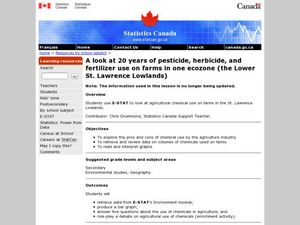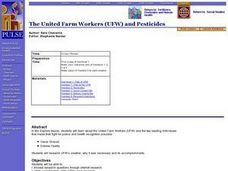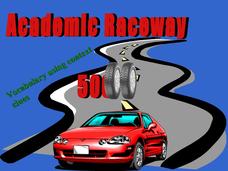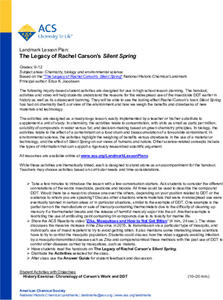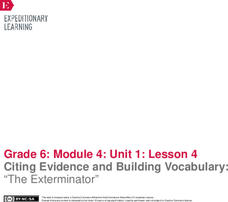Curated OER
Mobiles For Good-Mobile Phone Uses
In this mobile phone activity, students read a selection about mobile phones and their uses in today's society, then complete a variety of comprehension activities related to the passage.
Curated OER
Nutrition: It's In Your Hands
Fourth graders use this lesson to focus on their health, nutrition and the state of the environment. In groups, they examine the various types of land, water and air pollutants and compare and contrast a food chain with and without a...
Cornell University
Beneficial Insects
A lot of people think of insects as pests. But actually, some insects are beneficial because they get rid of pests! After learning about beneficial insects, class members research given insects to find out if they are pests or predators.
Illinois Department of Natural Resources
Section Two: Why is Biodiversity Important?
Explore soil, genetic traits, natural resources, and pollution in a series of lessons that focus on biodiversity. Kids complete experiments to learn more about the importance of varied genes and organisms in an ecosystem.
Curated OER
Regents High School Examination: Living Environment 2009
Emerging ecologists need a full understanding of life, from the inner workings of a cell to the complex relationships among organisms. This examination is meant to assess high schoolers after an entire year course on the living...
Curated OER
Regents High School Examination: Living Environment 2007
Environmental science enthusiasts show what they know at the end of the year by taking this full-fledged final exam. They answer multiple choice, graph interpretation, and essay analysys questions, 73 of them in all. Topics range from...
Curated OER
Effects of chemical use in Agriculture
Pupils research environmental data to create a bar graph. For this agricultural ecology lesson, students research the pros and cons of chemical use in farming. Pupils debate on passing a law to reduce chemical use.
Curated OER
Altered Genes
Students describe the economic relationship between farmers, consumers, and food companies. They examine the issues regarding the reactions of consumers in this country and other countries to the use of gene-altered crops in food...
Curated OER
Pesticides and Eggshell Thinning.
Students analyze the calcium content of egg shells as an introduction to the toxic effects of pesticides on biological systems.
Curated OER
American History: The United Farm Workers (UFW) and Pesticides
Students are able to answer research questions through internet research. They write a bridf history of the UFW using research. Students are able to create resumes of Cesar Chavez and Dolores Huerta by researching their biography.
Curated OER
Academic Raceway 500: Vocabulary Using Context Clues
This vocabulary skills PowerPoint presents a game to determine the meaning of unfamiliar words using context clues within a sentence. The game is based on the theme of a car race. The goal of the PowerPoint game is to finish the race...
Curated OER
Pesticide Prevalence
Learners investigate the prevalence of pesticides in their communities by
searching their homes, visiting local stores and talking to extended family and friends. They conduct their search by classifying pesticides based on the pests...
Curated OER
Lithosphere and Groundwater
Focusing on the quality of our water sources, these slides are full of information about the aspects of our soil and groundwater that may affect pollution. The leaching of pollutants and their impact on health is explained. ...
Florida Department of Environmental Protection
Build Your Own Aquifer
Ever wondered how an aquifer works? Introduce your class to the amazing way many people get water by exploring how underground aquifers work. Two fun hands-on activities are used to help kids understand what an aquifer is, how it works,...
American Chemical Society
The Legacy of Rachel Carson’s Silent Spring
How do we protect crops and protect the environment at the same time? Using reading materials, learners explore the history of the use of pesticides and biocides. They create a timeline and then explore the current practices.
EngageNY
Citing Evidence and Building Vocabulary: “The Exterminator”
It is an out-of-body experience. Scholars take a look at the sidebars outside the body of the text in The Exterminator. They discuss the purpose of this type of text feature and work to determine the gist. Learners write unfamiliar...
National Institute of Open Schooling
Nomenclature and General Principles
Carbon, the base for all organic compounds, exists in nature in its purest form as graphite or diamonds. The 25th lesson in a series of 36 teaches pupils the nomenclature of organic compounds. Learners read about how to use the IUPAC...
EngageNY
Tracing a Speaker’s Argument: John Stossel DDT Video
Which side are you on? Scholars watch a video of John Stossel discussing the use of DDT pesticide. Learners talk about the purpose of the video and the speaker's argument and then complete a Tracing an Argument graphic organizer while...
Balanced Assessment
County Concerns
Apply area concepts to help farmers and settle county disputes. Scholars use a given diagram and information about an insecticide spraying campaign to determine the monetary benefit to farmers. They then decide which of two counties has...
Curated OER
Just Spray 'Em!?
High schoolers read the label of an insecticide and identify pertinent information. They tell that the higher the LD50 the less toxic the chemical. Students begin to extrapolate the impact of pesticide use beyond the death of the insect.
Curated OER
Natural Gardening
Students study the effect of pesticides on plants and insects. In this gardening lesson, students discuss the importance of insects. They define pesticides, evaluate their effectiveness and the problems they might cause. Students...
Curated OER
Playing in mud puddles
Students examine the effects of rainfall on different surfaces and discuss water pollution. They review the water cycle and the uses of water in daily lifestyles. Students discuss the effects of soil run off in streams and rivers.
Curated OER
Arsenic and Lead Scavenger Hunt
Health wizards read and discuss an article about lead contamination then come up with a plan to help solve the problem. They get into groups to develop a community solution within the parameters of a budget, feasibility, and the source...
Curated OER
Water Pollution
Get your scientists engaged in both recall and life application responses after reading a selection from a McGraw Hill science text (not included). Based on chapter 14, this water pollution worksheet has students review where water...








